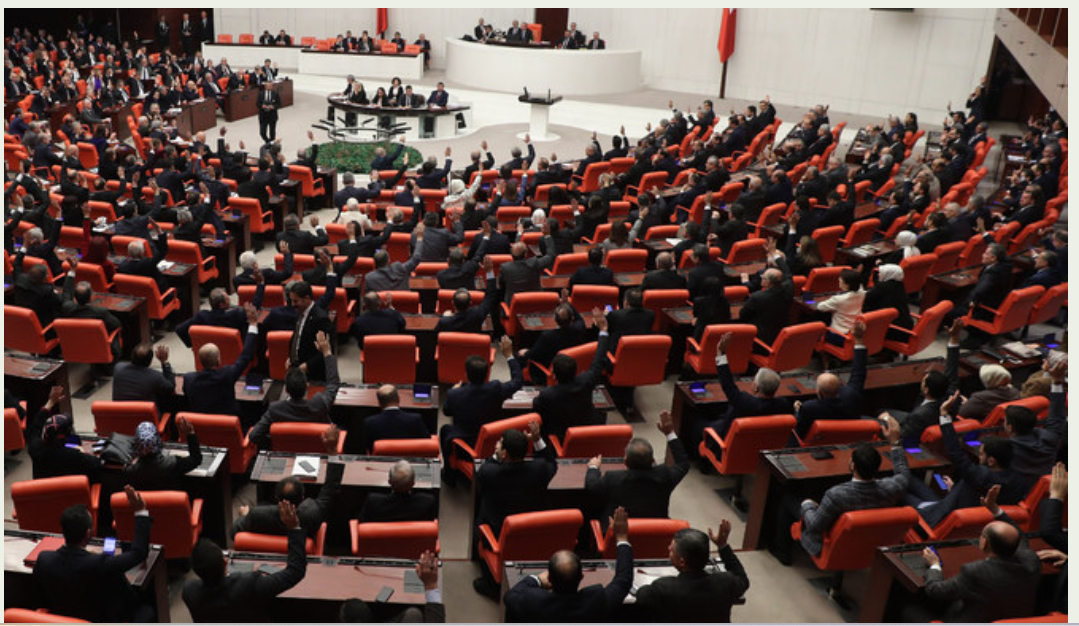Arab News columnist Menekse Tokyay explains the Turkish parliament’s decision to postpone a vote on Sweden’s NATO membership bid. She reports that the latest twist in an 18-month saga has raised questions about the reasons for the delay. The potential implications for Turkey are likely to be negative. The urgently needed F-16 order is certain to be held by the White House, depriving Turkish Airforce of significant operational capacity. Erdogan’s visit to Berlin, where he had reportedly asked for 20 Eurofighter jest didn’t pan out well, as Erdogan accused Germany of supporting Israel because of collective guilt.
Her article makes the following points:
Experts suggest the postponement may be linked to Turkiye’s hopes of buying $20 billion of F-16 fighter jets and modernization kits from Washington.
Turkiye plans to exert more pressure on the US to endorse the deal before approving Sweden’s bid to join NATO.
Officially, the postponement is attributed to MPs requiring further convincing on the issue.
The crisis in the Middle East has left President Erdogan open to opposition criticism that Turkiye’s economic problems have made him too soft toward the West.
Initially, the plan was for the committee to approve the accession protocol and send it to the parliament for ratification before President Recep Tayyip Erdogan’s signature.
However, an opposition lawmaker, Kursad Zorlu (IYIP), said that Turkiye should not ratify the application ahead of another NATO member, Hungary, which is also withholding approval for Sweden.
The next NATO foreign ministers’ meeting in Brussels is scheduled for Nov. 28-29.
Before the Turkish parliamentary meeting, the speaker Numan Kurtulmus told his Swedish counterpart via video call that Ankara aimed to complete the ratification process “as soon as possible.”
Paul Levin, director of Stockholm University Institute for Turkish Studies, believes that the ruling Justice and Development Party, or AKP, might have opted to delay the vote to avoid pushing through such an unpopular issue.
“They decided to postpone the vote to allow time to get more information about Sweden’s measures in response to Turkiye’s concerns,” he said.
Levin also highlighted a worrying aspect for Stockholm in the wording used by AKP committee members to postpone the vote, referring to the “immaturity of the negotiations.” This suggests a desire to continue negotiations to secure more concessions from Sweden.
In response to Turkiye’s security concerns, Sweden has tightened its anti-terrorism legislation, convicting individuals of inciting hatred by burning the Qur’an and financing terrorism.
Additionally, Sweden froze a bank account of a Kurdish group due to its ties with the outlawed Kurdistan Workers Party.
Experts say that the delay in the NATO accession process could have consequences for Turkiye’s relations with NATO and Washington.
“There is already a high degree of irritation with Turkiye in NATO capitals and Washington for what is widely seen as its obstructionism on this and many other matters. This delay can only amplify those sentiments,” Levin said.
According to Levin, if the delay continues, the US might sell F-35 fighters to Greece, while ignoring Turkiye’s request for the F-16s.
“Generally speaking, Erdogan’s transactional approach often allows him to extract concessions from allies in the short run since no one wants to ‘lose’ Turkiye,” said Levin.
“However, this approach comes with a high reputation cost in the intermediate to long term.”
Although the Biden administration signaled approval for Turkiye’s pending request to buy F-16 fighter jets and modernization kits, the US State Department has yet to formally notify Congress of the sale.
Turkiye’s Deputy Foreign Minister Burak Akcapar said that Turkiye expects the sale to be finalized “without any preconditions and as soon as possible.”
Ozgur Unluhisarcikli, Ankara office director of the German Marshall Fund of the US, said that Sweden’s accession to NATO has turned into a trilateral negotiation between Ankara, Stockholm, and Washington.
“With Sweden having fulfilled as much of Turkiye’s conditions as it politically can, the Turkiye-US track now drives the process,” he told Arab News.
“While both Ankara and Washington publicly reject this notion, the link between Turkiye’s request to purchase a new fleet of F-16s from the US and its ratification of Sweden’s NATO accession is no secret. While positive signals are coming from Ankara, the stars are yet to be lined up,” he said.
According to Unluhisarcikli, the crisis in the Middle East has left Erdogan open to opposition criticism that Turkiye’s economic problems have made him “too soft” toward the West.
“In turn, Erdogan’s positive remarks about Hamas have made it more difficult for the Biden administration to pass Turkiye’s F-16 request through Congress,” he said.
“Both Biden and Erdogan can deliver on these two issues if they choose to put enough political capital into the process, but Turkiye has local elections in five months, and the US is approaching a presidential election cycle,” he said.
“We are closer than ever to see Sweden as a new NATO ally, but a little more political will is needed not only in Ankara but also Washington,” he added.
Turkiye’s Defense Minister Yasar Guler announced on Thursday that Turkiye plans to buy 40 Typhoon fighter jets produced by four European countries, the UK, Germany, Italy, and Spain. Approval from all four is needed before the sale can go ahead.
Turkiye is reportedly in talks with the UK and Spain, but Germany objected to the idea, reportedly over concerns that the aircraft could be used for non-NATO missions.
Erdogan was visiting Germany on Friday for talks with Chancellor Olaf Scholz.
After being excluded by the US from the fifth-generation F-35 fighter jet program over its acquisition of the Russian S-400 air defense system, Turkiye aims to meet its fighter jet needs from alternative suppliers.
This includes developing its fifth-generation fighter jet and, in the interim, replacing its aging F-4 Phantom fighter jets with the Eurofighter Typhoon.
Follow our English language YouTube videos @ REAL TURKEY: https://www.youtube.com/channel/UCKpFJB4GFiNkhmpVZQ_d9Rg
And content at Twitter: @AtillaEng
Facebook: Real Turkey Channel: https://www.facebook.com/realturkeychannel/
